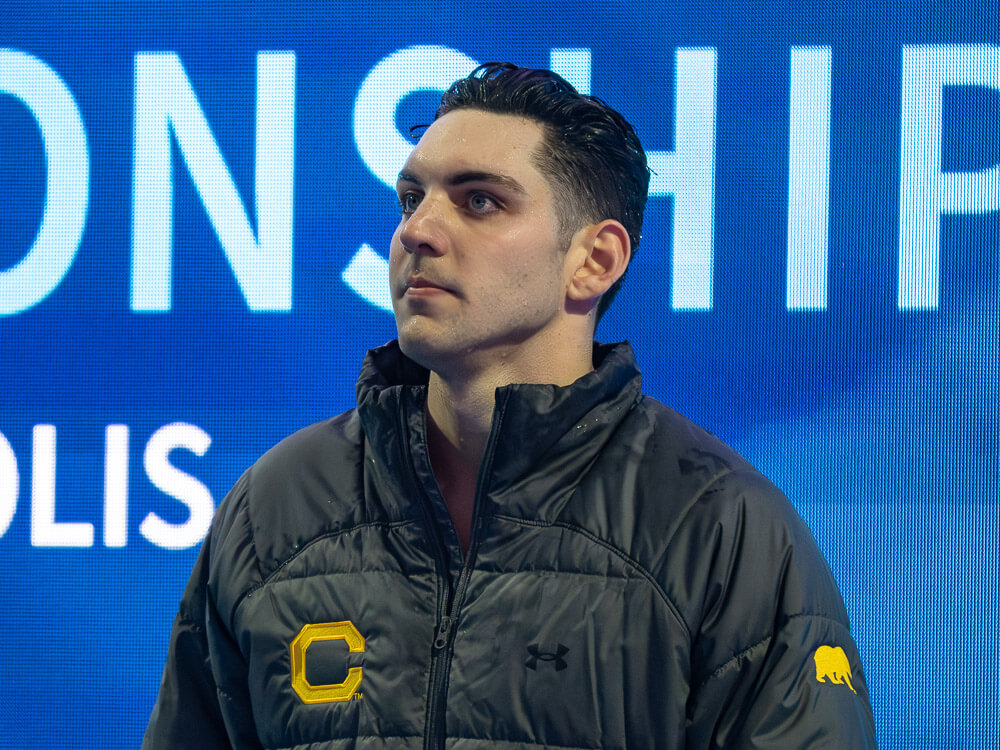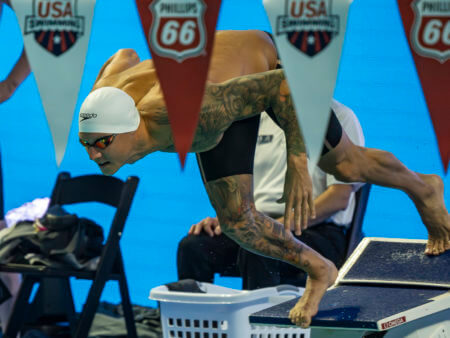American Men Seeking Sprint Pieces to Reclaim 400 Freestyle Relay Gold (Again)

American Men Seeking Sprint Pieces to Reclaim 400 Freestyle Relay Gold (Again)
Four years ago, the United States entered the Olympic year with six men having broken 48 in the 100 freestyle, sitting in perfect position to win two consecutive Olympic titles in this event for the first time since the Americans’ seven-Olympics winning streak was broken in a dramatic finish at the Sydney Games.
Indeed, the U.S. men would get the job done in Tokyo, but the one-year delay due to the COVID-19 pandemic stifled the U.S. momentum while bringing in a slew of new faces. Only four of the expected contenders even qualified for the final at the 2021 Olympic Trials, and only three qualified for Tokyo, with Ryan Held denied a spot after a poor finals swim.
Since then, the trend of turnover has continued. All three men who joined Caeleb Dressel on the finals roster at the Tokyo Games have retired, although Blake Pieroni has since returned to competition. Dressel, meanwhile, departed early from the 2022 World Championships, and while he is once again training with coach Anthony Nesty at the University of Florida, he was well off his best times at this summer’s Nationals, so he is a wildcard for 2024.
And in Dressel’s absence, the American winning streak in the 400 free relay was snapped at the World Championships. The American finals roster in Fukuoka consisted of Held plus three rookies, and despite strong efforts from Jack Alexy, Chris Guiliano and Matt King, Australia and Italy were too tough to handle on the end, with veterans Kyle Chalmers and Thomas Ceccon handling the anchor legs for their respective squads. But the Americans ended up with bronze, and they might have missed the podium entirely if co-favorite Great Britain had not been disqualified in prelims.

Caeleb Dressel — Photo Courtesy: Peter H. Bick
Now, of all the American relays entering the Olympic year, the lineup for this one is the most unclear. And the stakes are high: an ideal combination probably wins a third consecutive gold medal in Paris, but just as plausible is a relay that misses the podium entirely.
If the best-case scenario is going to come to fruition, two swimmers must be part of the squad: Dressel, who would have returned to 47-low territory in the 100 free, and Alexy, who would have maintained his career momentum after a stunning silver medal in the individual 100 free (and 50 free) at this year’s Worlds. These two surely have the highest ceilings, with Dressel owning the American record and ranking fourth all-time in the 100 free at 46.96 and Alexy sitting second-fastest ever among Americans at 47.31.
Topping the list of contenders to join them on this perfect relay is King, currently taking a redshirt year from the University of Virginia to train at Texas Ford Aquatics. Despite having never been on a finals relay at a senior-level international meet, King did not back down while racing Ceccon and Chalmers on the end of that Fukuoka relay, splitting 47.32.
But the margins between these contenders are incredibly tight. Here’s what the times looked like in 2023, with Dressel nowhere close to the top group following his hiatus from training:
1. Alexy, 47.31
2. Held, 47.63
3. Destin Lasco, 47.87
4. King, 47.93
5. Guiliano, 47.98
6. Macguire McDuff, 48.08
7. Justin Ress, 48.14
8. Brooks Curry, 48.26
9. Drew Kibler, 48.37
10. Maximus Williamson, 48.38
10. Jonny Kulow, 48.38
12. Patrick Sammon, 48.46
The trick to qualifying for a U.S. men’s 400 free relay is simply to get into the final and take your chances, with six out of eight swimmers almost always qualifying for the major meet, with Held’s 2021 exclusion the lone exception. And the men who get the job one time will not necessarily achieve the same success one year later. In 2024, maybe the successful ones are McDuff, who excelled in prelims at U.S. Nationals but faltered at night, or Curry, a 2022 World Champs finalist in the 100 free who had a poor prelims swim at this year’s Nationals.
It’s worth noting that eight of the 12 men on that list are still in college or have college eligibility remaining. Sprinters at age 22 or younger tend to make continual improvements, so maybe some of these men could break into sub-48 territory by the time they reach the Olympic Trials next June in Indianapolis, just like Alexy, Lasco, King and Guiliano all made their maiden voyages into elite territory at this year’s Nationals.
Pay particular attention to the men who had not broken 50 prior to the start of 2023, two swimmers now tied for 10th in the country after each made huge improvements over the past year. Williamson, only 16 years old, out-dueled Aussie Flynn Southam for 100 free gold at the World Junior Championships, and he split as fast as 47.57 in relay duty. And Kulow, a sophomore at Arizona State, tied with Curry for silver in the 100 free at the Pan American Games after splitting 47.32 on relay duty in Santiago as he anchored the U.S. men to gold in the 400 medley.
Which of these sprinters can make the necessary improvements to be in position to qualify for the Paris Games? Can anyone unexpected jump into the mix with well-timed brilliance? And perhaps most importantly, will the Americans be able to assemble a team speedy enough to secure another gold?



